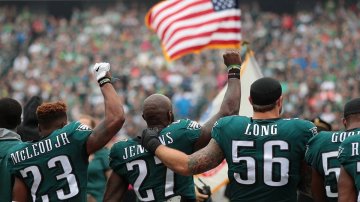Beyond the Game: Can Sports Truly Unite Us Amid Racial Divides?
Written By: Kyra Vandiver Professional sports have a remarkable way of bringing us together

exc-6733bc6e6e45074b76b1700d
Written By: Kyra Vandiver
Professional sports have a remarkable way of bringing us together. On game day, it doesn’t matter who you are or where you’re from—fans from all walks of life crowd into stadiums or gather around screens, sharing the same excitement, the same highs and lows. There’s a thrill, a rare unity, in cheering for a team alongside thousands of strangers who, for a few hours, feel like family. The Olympics might be the most vivid example of this, where athletes from across the globe stand side by side, waving their nations’ flags and showing us the beauty of unity.
Athletes do more than just play; many also give back to their communities, demonstrating the power of sports to make a difference. From building youth programs to funding health initiatives, they inspire us with values of resilience, teamwork, and compassion. This side of sports gives hope that they really can bridge divides and connect us in ways that transcend race, background, or culture.
But there’s another side to the story, one harder to face. Racial inequality hasn’t disappeared, and it plays out on the field as much as it does off. Many athletes, particularly athletes of color, face levels of scrutiny that often feel unfairly harsh, rooted in biases that linger. Take Colin Kaepernick, for instance. When he knelt during the national anthem to protest racial injustice, he used one of the biggest platforms possible to address issues that many would rather ignore. The backlash was swift and intense, reminding us of how hard it still is to talk about race, even in spaces meant to be for everyone.
And it’s not just on the field. Behind the scenes—in coaching, management, and executive roles—people of color remain underrepresented. For all the unity that sports foster on the field, these disparities highlight how far we still are from equality.
Even the way we talk about athletes reflects these issues. Sports media often label Black athletes as “naturally talented” while describing white athletes as “hardworking.” These labels might seem subtle, but they reinforce old stereotypes, limiting how we view athletes of color and boxing them into narrow narratives that are far from fair.
Sports connect us in ways that few other things can, yet they also mirror the divides we’re still working to overcome. Moving forward, we must ask ourselves what unity in sports truly means and what needs to change for it to be genuine. We’re seeing progress: leagues like the NBA have begun to support athlete activism and increase diversity in leadership. These are small steps, but they’re in the right direction.
Athletes themselves are stepping up, using their voices to push for change and to make us confront uncomfortable truths. In doing so, they remind us that sports don’t just reflect our world—they can help change it. Through their courage and determination, they remind us that the work is far from done but that maybe, just maybe, sports can lead the way




